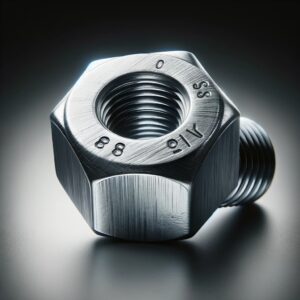
Chemical nickel plating in mechanical engineering is a process used to apply a protective coating of nickel to metal surfaces. This process is essential in the mechanical industry to improve the surface properties of components such as screws, bolts, machine parts and tools. Chemical nickel plating offers protection against corrosion, wear, and abrasion, extending the service life of components and improving their resistance to weathering and chemicals.
How much demand is there for chemical nickel plating in the mechanical industry?
The market need for chemical nickel plating in the mechanical industry is fueled by the growing demands for components and mechanical parts that possess high performance and durability. In an increasingly competitive industrial environment, companies are looking for solutions that can improve the strength, durability and reliability of their products. Chemical nickel plating offers an effective solution to meet these needs, providing reliable corrosion protection, increased wear resistance and improvements in the surface properties of mechanical components. As demand for machinery, industrial equipment, automotive components and electronics increases, chemical nickel plating becomes increasingly crucial to ensure product quality and longevity. In addition, growing environmental awareness has led to the search for more sustainable solutions, and chemical nickel plating can be made using environmentally friendly processes, thus meeting the needs of the modern market.
The benefits it brings to the mechanical industry
Mechanical nickel plating in the mechanical industry offers a wide range of benefits that contribute to the quality, durability, and performance of mechanical components and parts. One of the main advantages is corrosion protection. The nickel layer applied to the metal surface creates a protective barrier that prevents oxidation and corrosion, thus extending the service life of components and reducing the need for maintenance. In addition, mechanical nickel plating improves the wear resistance of treated surfaces, reducing friction and abrasion and prolonging component life. This is especially useful for parts subject to high levels of mechanical stress, such as gears, bearings and crankshafts. In addition, mechanical nickel plating can be used for aesthetic purposes, giving components a shiny, professional appearance. In summary, the benefits of mechanical nickel plating in the mechanical industry include corrosion protection, wear resistance, improved performance and aesthetic finish.
What will be the future of chemical nickel plating in the mechanical industry?
The future of chemical nickel plating in mechanical engineering could evolve in several directions, taking into account changes in technologies, environmental regulations and market needs. Here are some possible developments:
1. More sustainable technologies: With an increased focus on the environment, there may be an intense search for more eco-friendly chemical nickel plating processes. This could include developing less toxic chemical solutions and reducing the use of pollutants. Alternative technologies, such as electrochemical nickel plating, could become more prevalent to reduce environmental impact.
2. Improvements in strength and durability: As materials and processes continue to develop, there may be an increasing emphasis on finding nickel plating solutions that offer greater resistance to wear, corrosion, and high temperatures. This could lead to the introduction of new chemical formulations or the combination of different materials to improve the properties of nickel coatings.
3. Automation and digitization: Automation of chemical nickel plating processes could become increasingly widespread, with the adoption of robotic systems and digital technologies to improve process efficiency and accuracy. This could enable faster production, reducing processing time and increasing overall productivity.
4. Customization and innovation: As demand for highly customized, high-performance mechanical components increases, there may be a greater demand for customized nickel plating solutions to meet specific needs. This could lead to increased innovation and development of new technologies and processes to meet customer needs.

